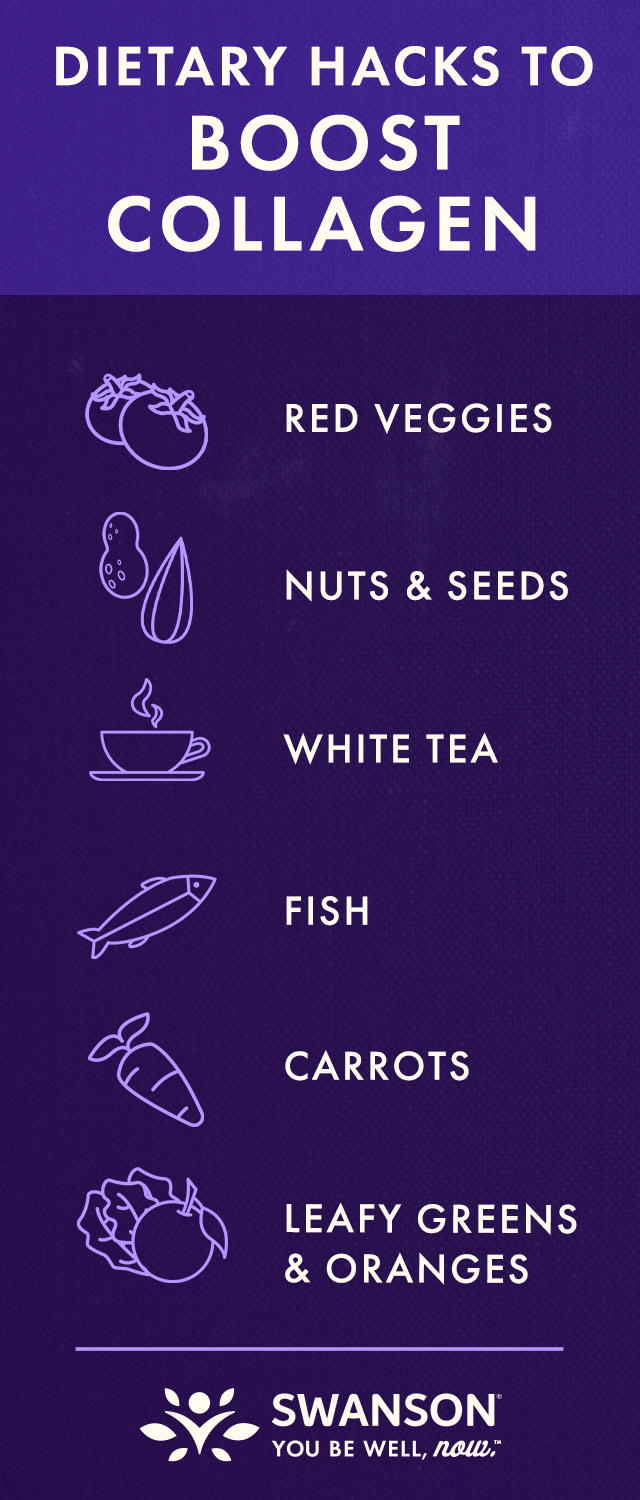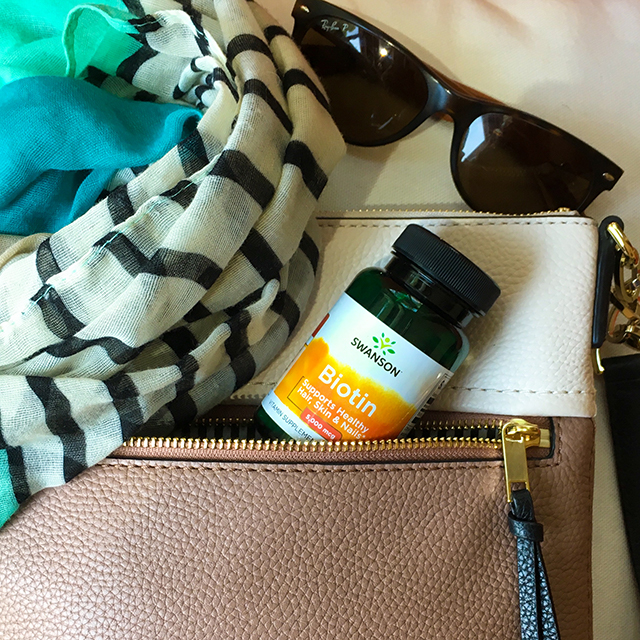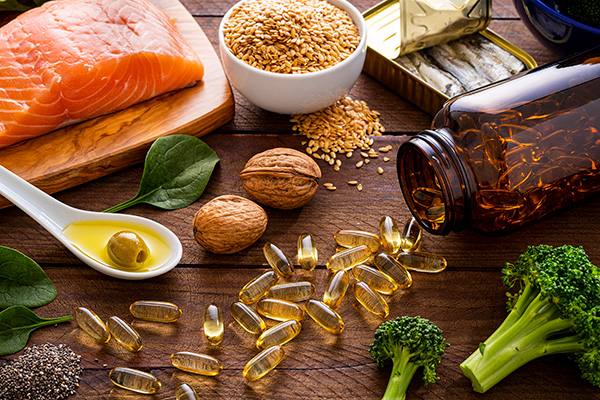What is Collagen?
If you’re wondering what collagen is, the simplest idea is to think of it as being a major part of… you! Collagen forms the building blocks for almost all your body, from bones and connective tissues to muscles and skin. In fact, collagen represents about 30% of the protein in your body, making it a pretty essential part of your whole makeup.1
As a protein, collagen is made of the amino acids hydroxyproline, proline and glycine. But it’s not just amino acids that make up collagen. It’s also comprised of powerful nutrients including copper, manganese and zinc, along with the potent antioxidant vitamin C.1
Collagen is like an important construction material and its purpose is to help make a strong, healthy body that works properly for many, many years.
Types of Collagen
There are quite a few types of collagen (28 to be exact),2 but the most commonly studied and supplemented types are designated by Roman numerals I, II and III.
- Type I collagen is the most prevalent in your body (about 90% of the collagen present). It is very dense and contributes to bone and connective tissues (tendons, ligaments), in addition to the skin. The layers of your skin also contain Type IV collagen, although that type is less commonly discussed.1
- Type II collagen is most commonly used by the body for joint health as it forms the basis for elastic cartilage.1
- Type III collagen supports the health and strength of arteries, muscles and organs.1
As you can see, the various types of collagen have their similarities, but their areas of support are different. Look for a quality collagen supplement that delivers the type, or types, that suit your needs.
What is Collagen Made Of?
Collagen is naturally comprised of amino acids and nutrients bound in a triple helix structure. Amino acids are the building blocks of protein. The nature of the collagen structure can vary depending on the type of collagen.2
When it comes to collagen supplements, these may be crafted from marine sources, such as for Type I, poultry sources (for Type II) or from bovine sources (for both Type I and Type III). When collagen supplements are made from animal sources, they are called “collagen peptides,” with the word peptide referring to tiny bits of collagen protein which has been broken down into a powder or perhaps a tablet.
Another form of collagen supplement is called collagen hydrolysate. In this form, the powder is comprised of very tiny peptides and specific amino acids which, when combined, form the basis for the production of collagen within the body. The tiny nature of the peptides in hydrolysate form is associated with increased absorption by the body.3
The Benefits of Collagen
Collagen has been the subject of immense research over the decades due to its rich health benefits. Some of these benefits include:
Collagen for healthy skin
Hydrolyzed collagen supplements have been linked to enhanced skin hydration, smoother texture and increased elasticity—all of which may contribute to a more youthful appearance.3
Collagen for healthy hair
Collagen, in particular marine-sourced collagen peptides, have shown positive effects in scientific studies involving the strength and growth of hair.4
Collagen for healthy bones and joints
Collagen peptides have been studied for their contribution to the mineralization and strengthening of bone and joint structures, particularly among postmenopausal women.5
These and other health benefits have been associated with collagen supplements of various kinds over the years. It’s exciting to note that the subjects of studies come from a wide range of backgrounds, meaning the potential for health benefits is available for almost any age group. Justine Hays, Registered Dietitian, notes “Like any supplement, consider it an ingredient in the recipe for overall health. Your body won’t put collagen to use just on your hair or nails, it will be used where your body needs it. Combining a collagen supplement along with a healthy eating pattern, can help you fill protein gaps and may better support your bodies efforts to look and feel its best.”
Sources of Collagen
In addition to quality collagen supplements, there are many food sources from which to help achieve important daily allotments of collagen. These include:6
- Dairy, eggs
- Meat (beef/poultry)
- Fish
- Legumes and soy
It’s also important to remember that collagen requires certain nutrients like zinc or vitamin C to be formed. These nutrients can be found in foods such as:6
- White tea (catechins)7
- Shellfish, meat
- Nuts, seeds
- Berries, fruit
- Whole grains
- Carrots
- Leafy greens
- Red vegetables
Can Collagen Be Vegan?
Collagen is derived from animal proteins, and is therefore not available in a vegan form. However, it is possible to support the body’s natural production of collagen by eating specific plants which contain the needed nutrients for collagen formation. Additionally, there are some vegan-friendly collagen support supplements, such as Swanson’s Vegan Collagen Builder.
When Should You Start Taking Collagen?
It’s always best to discuss with your doctor before beginning any supplement regimen, and this is particularly true if you have certain health-related conditions or concerns. With that in mind, it is also true that our bodies become less efficient and producing and maintaining collagen as we age. In fact, the quality and longevity of our natural collagen becomes increasingly weak over time, particularly after menopause.1 Supplementing with collagen may be a positive way to support healthy aging, a practice which can be started almost any time.
Make collagen support a part of your beauty, strength and healthy aging routine today for benefits that will last long into the future.
You be well, now.
Swanson

About Justine Hays, RD
Justine Hays has been a registered dietitian for nine years. She has a remarkable ability to communicate high level scientific information in a way that is tangible for all people to understand and apply to their everyday lives. This is evidenced by a robust writing career, which includes a cookbook on heart health and supporting other health and wellness entities in their public facing communications. Her list of publications is available in her resume and on her website. Additionally, she is a skilled facilitator in community nutrition, which includes public programming and hands on cooking programs through the SNAP-Ed program.
*These statements have not been evaluated by the Food and Drug Administration. These products are not intended to diagnose, treat, cure, or prevent any disease.
Sources
- Collagen. Cleveland Clinic. Read source
- The Collagen Family. Cold Spring Harbor Perspectives in Biology. Read source
- Hydrolyzed Collagen Supplements. The Journal of Clinical and Aesthetic Dermatology. Read source.
- Fish Collagen Peptide in Human Dermal Papilla Cells. International Journal of Molecular Sciences. Read source
- Collagen Peptides Improve Bone Mineral Density. Nutrients. Read source
- Collagen. Harvard T.H. Chan School of Public Health. Read source.
- Effect of White Tea. National Library of Medicine. Read source.




